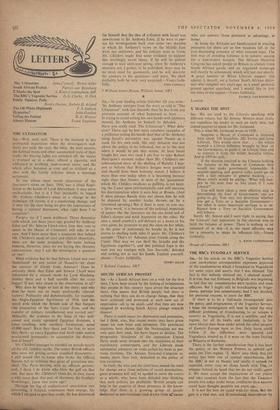SIR,--111 your leading article (October 30) you write: 'Sir Anthony
emerges from the story as told in "The Ultimatum" with less discredit than he has from any previous account of what happened at Suez... . In trying to avoid soiling his own hands with [dubious means], Sir Anthony let himself he deluded. . Have you really read 'The Ultimatum'? What delu- sion? There can be few more repulsive examples of a politician soiling his hands than that of Sir Anthony using Israel's preventive war against Nasser as a mask for his own ends. His only delusion was not about the policy to be followed, but as to the date when it would be put into action. At least Israel fought her own war (and I am free to take Robert Henriques's account rather than Mr. Childers's un- substantiated story of the shelling of Rafah). I hap- pen to believe that Britain's designs were justified and should have been honestly stated. I believe it more than ever today when it is becoming increas- ingly clear that Nasser, in spite .of the 'guarantees' which Mr. Childers swallows so gullibly, is not keep- ing the Canal open internationally and will increase his discrimination when it suits him or Russia. (And if what pleases Russia does not please him he will be deposed by another leader thtown up by a fomented uprising.) But if Suez is now, as you say, a 'dirty word,' it is because of the political ineptitude of papers like the Spectator on the one hand and of Eden's slyness and weak hypocrisy on the other. He uses a small country's self-defence as a pawn in his own game, he proposes to put the onus on her while, in the guise of policeman, he breaks in, he is not averse to shelling both sides (I quote Mr. Childers's account : 'That's it! Advance your friends along the Canal. That way we can shell the Israelis and the Egyptians together!'), and this political lago is the man you say emerges with 'less discredit,' deluded and seeking not to soil his hands. Explain yourself, please.—Yours faithfully,






































 Previous page
Previous page